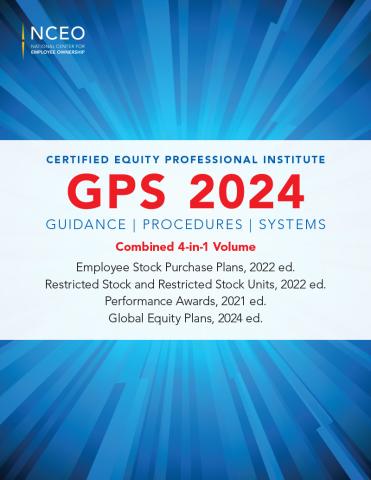Description
Attention CEPI students: Since 2020, the CEPI curriculum has been all-digital, and the CEPI provides you digital access to the books, including this, as part of the exam fee. You still can buy the printed books from us as a supplement to the free digital access you receive from the CEPI. See our CEPI information page.
The Certified Equity Professional Institute (CEPI) is part of the Leavey School of Business at Santa Clara University in California's Silicon Valley. The CEPI was founded in 1989 by a group of equity compensation professionals. Their mission was to establish, promote, and provide certification and continuing education for the equity compensation industry. Since its founding, the CEPI's self-study curriculum has served as the industry's educational standard. Organizations and individuals use CEPI exams as a measurement of basic (Level 1), intermediate (Level 2), and advanced (Level 3) knowledge, skills, and abilities related to equity compensation.
The CEPI's ongoing GPS (guidance, procedures, systems) project has produced a series of books designed to provide impartial guidance for everyone working in the field. This volume combines the latest versions of the four GPS books currently assigned to CEP candidates (Employee Stock Purchase Plans, Restricted Stock and Restricted Stock Units, Performance Awards, and Global Equity Plans), with the global book newly updated for 2024.
Product Details
Table of Contents
Preface
CEPI Advisory Board
Employee Stock Purchase Plans, 2022 ed.
Restricted Stock and Restricted Stock Units, 2022 ed.
Performance Awards, 2021 ed.
Global Equity Plans, 2024 ed.
Excerpts
From Employee Stock Purchase Plans, 2022 ed.
All employees participating in an ESPP or offering must have the same rights and privileges. This requirement is not violated if the plan specifies that an employee may not contribute more than a maximum percentage of compensation or limits the maximum dollar (or other currency) amount that can be contributed or number of shares that can be purchased. For example, a plan that specifies an employee can contribute up to 8% of compensation would not violate the equal rights and privileges requirement. Less favorable terms may be offered to citizens or residents of a non-US jurisdiction if required under local law without violating this requirement. If non-US employees require more favorable terms under local law, such terms must be offered to all plan participants within the same offering. The carry forward of excess contributions representing a fractional share, discussed in paragraph 3.2.7, does not violate the equal right and privileges requirement. The carry forward of contributions in excess of a fractional share, (i.e., where employee or offering limits have been reached) would be a violation of the equal rights and privileges requirement unless all other employees within the same offering were permitted to make lump sum payments of equal amounts.
From Global Equity Plans, 2024 ed.
4.7.2. Some companies require an employee accept a grant to document that the employee was notified of the award and to agree to tax withholding and other grant terms. Companies use a variety of methods to indicate acceptance. The format for accepting an award may be specified or restricted in certain countries. Many companies require non‑US employees to accept an award, even though US employees may not be required to accept awards. Requiring acceptance may be helpful to provide support for the Company’s position with regard to labor law issues discussed in paragraph 3.4. Formal acceptance may also avoid potential problems under local law. Electronic signatures may not result in an enforceable award agreement if there is uncertainty as to the employee’s identity or consent. There also may be some terms in the award agreement (e.g., data privacy consent) that are not legally binding if electronic acceptance is used. Many companies still use electronic signatures for simplicity and consistency even though electronic signatures may be problematic as they may not carry the same weight as formal signatures under local law. It may be difficult to obtain employee acceptance for grants that do not involve voluntary participation or exercise (e.g,. restricted stock units). Some companies have turned to relying on “deemed acceptance” whereby an award that is not accepted or rejected by the employee by a certain date will be deemed to have been accepted. Depending on the country and the types of terms and conditions attached to the award, this may or may not be considered an effective acceptance. Consult legal counsel to determine the requirements for each country and the risks of noncompliance.
